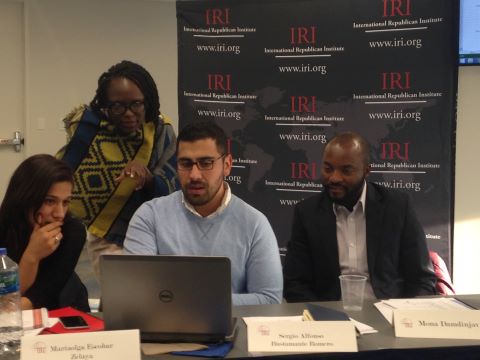Reflecting to Adapt: A framework for understanding and responding to COVID-19’s disruptions in the DRG sector
COVID-19 has disrupted all aspects of life – and the design and implementation of democracy, human rights, and governance (DRG) programs is no exception. In the early phase of the pandemic, the International Republican Institute’s (IRI) Evidence and Learning Practice recognized that a collaborative process would be critical to rethinking our project approaches in light of COVID-19.
Recognizing this need, we developed a straightforward reflection framework and process that IRI program teams have used to pause and systematically consider what COVID-19 means for current projects’ goals, as well as the countries and regions where projects are implemented. Leveraging the main principles of CLA, this process uses the well-known “What? So, What? Now, What?” reflection model to answer these questions in four main spheres in the programming ecosystem: problem; incentives and assumptions; approach; and results.

IRI staff collaborate during a training workshop on learning strategies.
Photo Credit: Natalie Trisilla, IRI
Here’s how we adapted this process to the current environment – and what we learned along the way:
What? In the first step of the process, we help teams recall and reidentify the “what” of their project:
- What was the original problem?
- What incentives did we intend to leverage or create to implement our project successfully?
- What approach did we plan to use? And, finally –
- What outcome-level results did we anticipate achieving?
In some cases, simply recalling the main problem, incentive structures, and core assumptions of the project within the new context of the global pandemic is enough to highlight new dimensions of the problem and its affects. For example, efforts to increase voter turnover in Uganda through a door-to-door campaign will need to look different during a health pandemic. Research shows that this reflection alone can lead to fresh perspective and thinking about the issue and possible solutions. In most cases, though, a deeper analysis to answer the question “So, what?” is warranted.
So, What? In this second phase of the process, we guide staff to consider the “so, what?” question. More specifically: What does COVID-19 mean for the project? How is COVID-19 affecting the problem and how is it challenging our core assumptions and plans?
This is the heart of this reflection process and where we spend the most time with our staff to thoroughly examine some of the following questions:
- Has COVID-19 made the problem more urgent or less urgent?
- Did the pandemic, and protocols to mitigate it, change who the problem was affecting or how it was affecting them?
- Has it disproportionately affected marginalized groups or resulted in newly marginalized individuals?
- What new problems have emerged that now need to be addressed or incorporated into the project’s approach?
- What incentives have disappeared or emerged and how will we leverage or mitigate those moving forward?
More specific questions for our DRG colleagues might include:
- Do government officials have increased incentive to engage with citizens or less?
- Do citizens have increased demand for transparency or accountability from their elected officials?
- How have the changes in daily life affected citizens’ interest in government?
- How have political parties’ priorities changed during COVID, especially with many elections being postponed?
Now, what? Armed with reflections from the previous steps, we guide teams to answer the last question, “now, what?” In this final step, we develop a plan of action with staff, asking:
- What are we going to do or change about our program now that we have a clearer understanding of the challenges our partners and beneficiaries are facing and a sharper understanding of how it affects our project’s goals?
- Do we need to change the type or sequencing of or topics of our training and support activities? Are there newly marginalized groups that we need to prioritize in our outreach?
- Do we need to expand or otherwise modify our definition of “results” in this pandemic context?
- Are civic activists using knowledge and skills in new ways, perhaps to advocate or communicate with different government officials or ministries?
- Are new relationships developing and how can these be leveraged moving forward?
- Are watchdog organizations now monitoring government funding related to health initiatives instead of infrastructure or other procurements?
- What additional skills or connections to new sectors do they need to do this effectively?
With answers to these questions, our teams are revamping their approaches and reimaging their partnerships to match not just the short-term realities of the pandemic, but also the medium- and longer-term social, political and economic changes afoot.
Providing the space and framework for teams to examine programming goals and approaches thoroughly yet efficiently in light of the pandemic has led to several programmatic adaptations and further sharing of lessons across IRI. For example, our South America team is sharing their experiences of web-based learning courses with our Middle East and North Africa team, which is exploring an e-learning module for a civil society capacity building project. Through this reflection exercise, our Middle East and North Africa team realized their civil society partners in Tunisia were using their advocacy and communication skills to support local leaders in responding to the pandemic, something that was not foreseen when the project began last year.
In Indonesia, our team used this reflection session to consider what the pandemic means for decentralization, anticipating both increased support for decentralization among local officials and greater skepticism of it at the national level. In Uganda, our team is using this reflection framework to reexamine planned political party support, recognizing that without in-person campaigning many Ugandans may be without access to critical party platform information ahead of the recently postponed 2021 elections.
As the COVID-19 pandemic persists, we hope IRI’s experience can provide others with a starting point to use CLA approaches to reimagine results and rethink strategies to achieve them.



